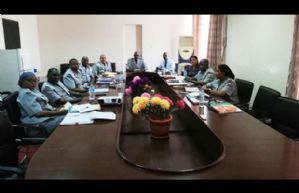WCO initiates implementation of "Harmonizing the classification of goods based on WCO standards to enhance African trade" programme funded by the EU

From 17 to 21 December 2018, two experts from the WCO Secretariat conducted a diagnostic mission to assess the existing infrastructure of Niger's Directorate General of Customs (Niger Customs) in respect of work undertaken with regard to the Harmonized System and tariff classification as well as to Customs valuation. This mission is the first of its kind to be conducted under the EU-funded programme, one of its specific objectives being to build the capacity of the Customs administrations in drawing up, implementing and managing their national systems of classification. These national systems must comply with the HS Convention as well as with international, regional, continental and global standards, and with commitments and best practice.
The mission was conducted in response to a request from Niger Customs, which was striving to build its institutional and operational capacity with a view to reviewing tariff classification and the Customs valuation of imported goods following its resumption, in February 2017, of its Customs role, duties which had previously been contracted out to a private-sector goods inspection company.
Mr. Oumarou Amadou Petitot, Deputy Director General of Niger Customs, chaired the opening and closing sessions of the mission. In his address, he indicated that Niger Customs had taken various measures to combat Customs offences and fraud with a view to maintaining or even enhancing the level of mobilization of Customs revenue that had been reached by the end of the contract for the inspection of imported goods. Included in those measures are, for instance, the creation of a unit responsible for managing the databases required for monitoring taxation in respect of imported goods and the establishment of Nigerien logistics company SONILOGA, which assists Customs in the valuation of used vehicles.
During the mission, the WCO experts hosted working sessions attended by the head officials from the Niger Customs directorates affected by tariff classification and Customs valuation control and held discussions with various partners from the private sector, which were also attended by a representative of the country's Chamber of Commerce. Focusing on stakeholders' rights and obligations under certain laws and regulations in force in Niger, the discussions were both frank and productive.
The resulting assessment highlighted the future challenges for Niger Customs and identified a number of measures that could be enacted specifically to improve the situation regarding the inspection of goods imported into Niger, including the monitoring of imports carried out by economic operators in the informal sector, which contingent makes up a significant proportion of the country's economic activity. These measures, to be disclosed by the mission heads in the form of recommendations, would have to be included in an action plan, which would be essential for the continuing provision of technical assistance to Niger Customs as part of the "Harmonizing the classification of goods based on WCO standards to enhance African trade" programme funded by the European Union.